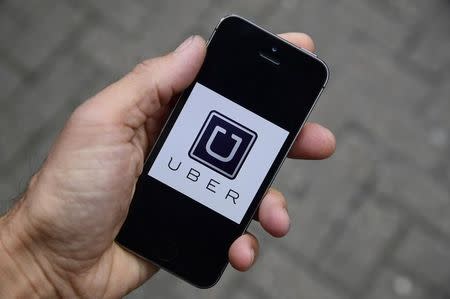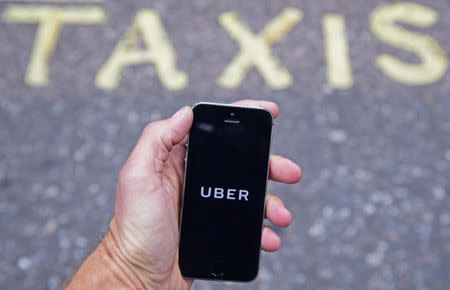Uber defends business model, wants to avert strict EU rules
By Foo Yun Chee LUXEMBOURG (Reuters) - Uber [UBER.UL] defended its business model in Europe's highest court on Tuesday, saying its service had made it easier for people to get around and cut pollution as it fights a case which could leave app-based startups facing tougher regulation. The ride-hailing app, which expanded into Europe five years ago, has come under attack from established taxi companies and some EU countries because it is not bound by strict local licensing and safety rules which apply to some of its competitors. Uber's dispute with Barcelona's main taxi operator, which in 2014 accused it of running an illegal taxi service via its UberPOP service, is seen as a landmark case which could lead the Court of Justice of the European Union (ECJ) to label it a transport company rather than a digital service. Such a ruling would subject the company to stricter rules on licensing, insurance and safety, with possible knock-on effects on other startups such as online home rental company Airbnb and food delivery company Deliveroo, other big brands in the sharing economy. It could also limit efforts by the European Commission to boost e-commerce, a sector where the EU lags behind Asia and the United States, to drive economic growth and create jobs. "Uber is part of a wave of technology which radically changes the way we shop, obtain information," Uber's lawyer Cani Fernandez told a panel of 15 judges at the ECJ. "Uber contributes to linking drivers and passengers more efficiently," she added, pointing to improvements in getting around, lower pollution and easier access to parking. Uber is valued at more than $60 billion and its investors include Goldman Sachs and GV, formerly known as Google Ventures. It has faced protests, bans and legal action around the world including in the United States and much of Europe as it disrupts existing business practices. In this latest case, Barcelona's main taxi operator argues Uber has an unfair advantage because it does not bear the costs which taxi companies face. "If there is a transport service provided, a company should not be able to hide behind the thin veil of a different service," its lawyer Montse Balague Farre said. Lawyers for Spain, Ireland and France also argued that Uber should be treated as a transport company. The Netherlands where Uber has its European headquarters, Estonia and the European Free Trade Association (EFTA) however said the company merely provides a connecting service between the passenger and a driver. The court should "send a message that innovation and new business opportunities in the European Union should be encouraged and not hindered by submitting them to unnecessary rules," EFTA's lawyer said. An ECJ adviser is expected to give a non-binding opinion in the coming months before the judges give their verdict. The case is Case C-434/15 Asociación Profesional Elite Taxi. (This story was refiled to remove duplication in headline) (Reporting by Foo Yun Chee; Editing by Keith Weir)



